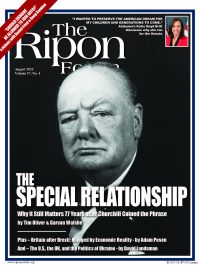
After the 2016 referendum but prior to the implementation of Brexit, two main points about its coming economic impact were evident: First, gravity matters. One of the few things that economics can treat as nearly a physical law is that economies trade and invest primarily with the economies that are closest to them geographically and historically. Brexit was running in the face of that.
Second, Brexit would affect more than just international trade. Instead, it had to be seen in a political context as well as an economic context of broader EU–UK commercial interactions involving foreign direct investment (FDI), financial flows, information networks, and immigration. As has been amply documented, most economic trends post-Brexit have come out pretty much as the mainstream economists expected, including losses of around 4% of GDP versus pre-Brexit trend growth.
During the 1990s through the mid-2010s until the Brexit referendum, the UK was one of the most open large economies in the world. On trade, it was comparable to France, Germany, Italy, and Spain, and it had larger inflows of FDI, immigration, foreign students, and financial capital; it far outstripped the U.S., Australia, and Canada proportionally for its size on the same measures. Thus, Brexit was not a small adjustment, but potentially a shift in the entire orientation of the UK economy, because it would impose a huge terms-of-trade shock to trade with its primary trading partner.
Most economic trends post-Brexit have come out pretty much as the mainstream economists expected, including losses of around 4% of GDP versus pre-Brexit trend growth.
There is no simple automatic mapping between international economic openness and per capita GDP growth, so this is not necessarily a welfare loss, and voters who chose Brexit may have had non-economic motivations. There is clear evidence, however, that post-Brexit Britain does look different from its peers: its trade and, more importantly, its private investment has recovered less from Covid-19 than other high-income economies, its labor mismatch problem has been more severe and lasting than that of the U.S., and its productivity growth has persistently lagged its peers.
Looking at receptiveness to foreigners, the UK had a long period, starting in the early 2000s, when it was attracting and retaining a large number of foreign-born people. After Brexit, EU immigration tailed off and became negative. The UK has not seen a decline in non-EU immigration and some evidence suggests there has been even a significant surge. It is noteworthy that, when so much of the pro-Brexit referendum campaign seemed to have been run on xenophobia (if not outright anti-migrant claims), we see a shift in terms of migration from EU sources to elsewhere. Whatever the expansion in non-EU migration, however, it is not strictly compensatory for the lost EU workers; importing more doctors and students does not make up for workers in agriculture, transport, hospitality and construction.
There has been a lot of attention in the UK on financial capital flows, whether it be the City of London managing other people’s money, oligarchs from Russia and the Middle East putting money into London real estate, or part of the long history of worrying about the pound. What often gets overlooked is the issue of how much FDI the UK used to attract (both brownfield and greenfield). There is clear evidence that inward FDI is extremely positive for growth, tending to lead to higher-wage jobs, more advancement in innovation and technology, more transfer of skills, and more sales of associated business services.
Yet, already by 2017, it was clear that while the UK auto industry (meaning Toyota, Nissan, Ford, Vauxhall, and Land Rover) would not immediately stop producing cars in the UK, it would soon stop producing them for export to Europe. Therefore, the plants and the associated investment would decline over time and would not be replaced. This is what we are seeing across other industries as well as autos.

There is clear evidence that post-Brexit Britain does look different from its peers — its trade and private investment has recovered less from Covid-19 than other high-income economies, its labor mismatch problem has been more severe and lasting than that of the U.S., and its productivity growth has persistently lagged behind its peers.
Similar to immigration, but over a longer period in the 1990s and early 2000s, the UK was a leading recipient of inwards FDI. It is no coincidence that this period coincides with the Maastricht Treaty allowing the UK a prime role as a bridge into European markets for American, Chinese, and Japanese companies. However, FDI inflows to the UK have fallen back in recent years. The UK is no longer a positive outlier compared to other, similar economies in terms of inward FDI.
What remains to play for is what economists refer to as the dynamic effects of openness, essentially what affects the trend growth rate going forward. The basic concern when a country shrinks trade and openness is that it is losing competition internally. Therefore, it gets less innovation and dynamism in its corporate sector, investments, and labor force. Dynamism also tends to decrease when it loses diversity of talent coming in, diversity of corporate cultures coming in, and so on. While the direct effect of trade on productivity growth is arguable but not evident, the direct effect of immigration and FDI on productivity growth is quite clear and strong. The collapse in corporate investment in the UK since Brexit, not recovering as it has in peer countries post-Covid, indicates this coming to pass.
As Adam Smith famously said (when Great Britain lost the Battle of Saratoga to the American revolutionaries), “there is a lot of ruin in a nation” — meaning even visible major setbacks are not enough to destroy a country’s well-being. The same is true of Brexit. The UK will remain among the 10 largest economies in the world, punching above its weight in business and financial services, in higher education, in cultural exports and tourism, and in foreign policy.
If it wishes to offset or replace the economic dynamism lost to Brexit, however, it should lean further into those strengths, and compete internationally on that basis. Trying to replicate the strengths of the EU or the U.S. in terms of diversified industry, let alone size of market, will be impossible. Being a location which attracts human and investment capital is attainable.
Adam Posen is President of the Peterson Institute for International Economics. In 2014, he was made a Commander of the Most Excellent Order of the British Empire by H.M. Queen Elizabeth II, for his services to UK economic policy.




